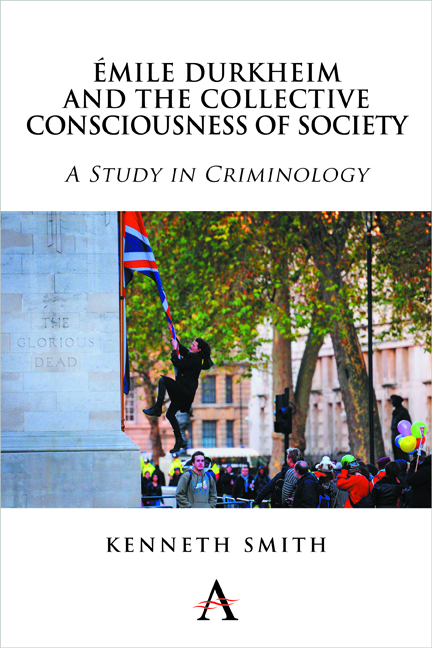Book contents
- Frontmatter
- Dedication
- Contents
- Epigraph
- Preface
- Introduction
- Part I The Concept of the Collective Consciousness of Society
- Part II The Form of the Collective Consciousness
- Part III Durkheim on Crime and Punishment
- Preface to Part III
- Introduction to Part III
- 8 Durkheim on Crime and Punishment in The Division of Labour in Society
- 9 Durkheim on Crime and Punishment in The Rules of Sociological Method
- 10 Interregnum on Suicide (1897)
- 11 Durkheim's Undeservedly Famous ‘Two Laws of Penal Evolution’ Essay (1901)
- 12 Durkheim on Crime and Punishment in Moral Education (1902-03)
- Conclusion to Part III
- Part IV Social Fact or Social Phenomenon? Durkheim's Concept of the Collective Consciousness as a ‘Social Fact’
- Part V Some Problems with Durkheim's Concept of the Common and Collective Consciousness
- Conclusion
- Appendix: On Paying a Debt to Society
- Notes
- References
- Index
8 - Durkheim on Crime and Punishment in The Division of Labour in Society
from Part III - Durkheim on Crime and Punishment
Published online by Cambridge University Press: 05 October 2014
- Frontmatter
- Dedication
- Contents
- Epigraph
- Preface
- Introduction
- Part I The Concept of the Collective Consciousness of Society
- Part II The Form of the Collective Consciousness
- Part III Durkheim on Crime and Punishment
- Preface to Part III
- Introduction to Part III
- 8 Durkheim on Crime and Punishment in The Division of Labour in Society
- 9 Durkheim on Crime and Punishment in The Rules of Sociological Method
- 10 Interregnum on Suicide (1897)
- 11 Durkheim's Undeservedly Famous ‘Two Laws of Penal Evolution’ Essay (1901)
- 12 Durkheim on Crime and Punishment in Moral Education (1902-03)
- Conclusion to Part III
- Part IV Social Fact or Social Phenomenon? Durkheim's Concept of the Collective Consciousness as a ‘Social Fact’
- Part V Some Problems with Durkheim's Concept of the Common and Collective Consciousness
- Conclusion
- Appendix: On Paying a Debt to Society
- Notes
- References
- Index
Summary
We should not say that an act offends the common consciousness because it is criminal, but that it is criminal because it offends that consciousness. We do not condemn it because it is a crime, but it is a crime because we condemn it.
(Durkheim 1989, 39-40)In books like Moral Education and Professional Ethics, based on Durkheim's lecture notes and published after his death, the reader should be aware that Durkheim usually begins a series of lectures by outlining a view that is not his own, and then goes on to criticize this as the lecture series proceeds. A view stated confidently at the beginning of a series of lectures cannot always, or even usually, be taken to be Durkheim's actual view on a particular question by the end of the series. Since The Division of Labour is not based on a series of lectures, but was a finished work – the first book he published and in fact the first half of his doctoral dissertation – this is not a problem for us here. However, what Durkheim has to say on the subject of crime and punishment at the beginning of chapter 2 of The Division of Labour – and it is an interesting point to note that nearly all of his discussion of this subject in The Division of Labour occurs in this one chapter – cannot unproblematically be taken as his final view on this subject, so often does Durkheim appear to change his mind on this question here.
- Type
- Chapter
- Information
- Émile Durkheim and the Collective Consciousness of Society , pp. 95 - 103Publisher: Anthem PressPrint publication year: 2014

